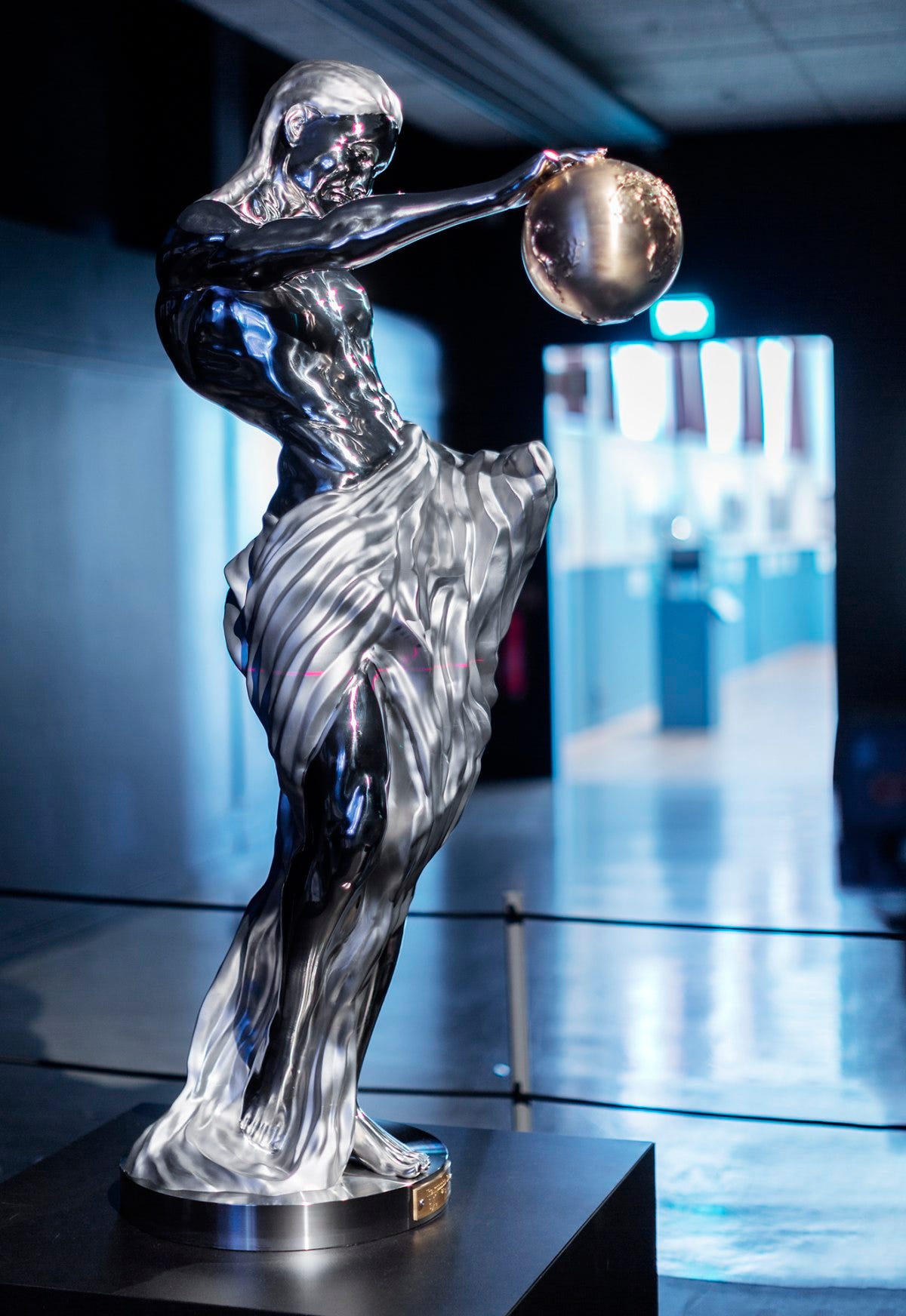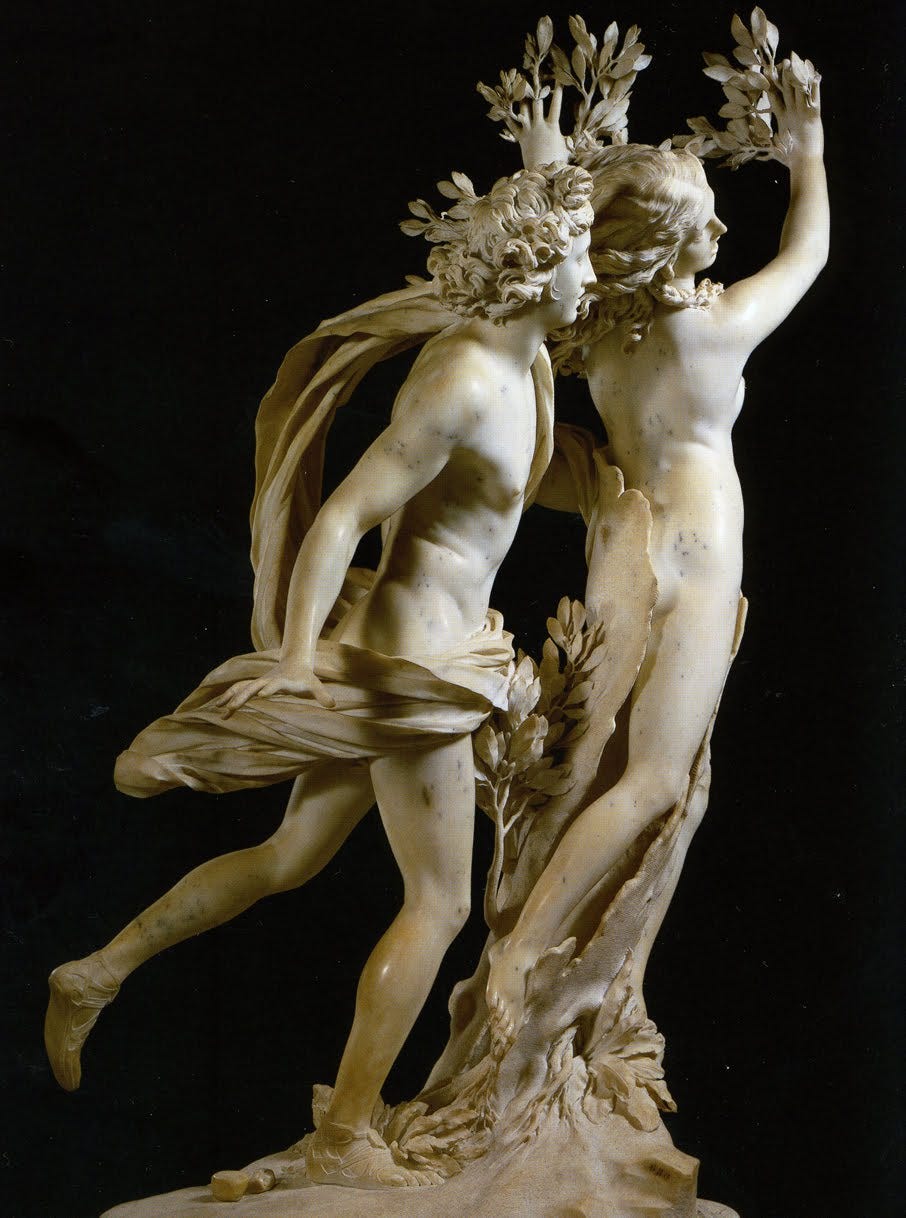Art and the Human Spirit: A Requiem
How the first generative AI statue is a soulless abomination & other stories.
My mother died this year on April 30th at 12:38AM. My stepdad and I held her hand as she struggled to breathe and then breathed no more.
There are few moments in life that offer greater clarity: the bottle of Fiji water with a straw in it; a handful of Werther’s butterscotch candies, scattered; the computer she hadn’t sat in front of in months; the electric blanket she kept pulling over her and then pushing off again because her seventy-pound body could no longer regulate its own thermostat.
This extraordinary thing—her death—was happening in the most ordinary circumstances, in the dead of night, in Houston, Texas, and we were its exhausted and heartbroken witnesses.
Dying is rarely peaceful. As vulnerable as it is, the body does not readily surrender its spark. It took months for my mother’s spark to fade. Now at the end of life, my mother could no longer swallow, which meant she was being waterboarded by her own secretions. In non-medical parlance, we call it the “death rattle,” and once you hear it, you can never un-hear it. We kept sedating her with morphine, terrified that we were giving her too little or too much, left alone to scrape through her dying process with nothing more helpful than Google searches and our own determination.
Giving a loved one in-home hospice care is one of the hardest things you can ever do. I took the night shift. When the human brain is synaptically fried, like my mother’s was, all the sedatives in the world won’t let it rest. My mother spent every one of those dark, lonely hours raving, moaning in pain, or blindly stabbing at the dial-pad on her cellphone trying to call her mother, who had been long dead.
Never in my life have I been that lonely. Even when I tiptoed into her walk-in closet to place whispered, furtive phone calls to John in New York City—John who was without a fixed address, struggling, and already exhibiting symptoms of PTSD.
No words could convey my desperation, my grief, my horror. My mother was a complicated woman … and also a beautiful one. I was haunted by memories of who she used to be and was no longer. This is what it had all come to, and there were moments, more than a few, when I, too, thought I might go crazy.
Night after night, I sat beside my mother, tending to her in the most intimate ways, ways she wouldn’t have wanted anyone tending to her. Sometimes I read to her, mostly the poems of Yeats, Auden, or her favorite, Edna St. Vincent Millay. I brought her popsicles and gave her countless shoulder rubs. In what has proven to be a turning point in my own life, I forgave her. There was a lot to forgive her for.
Always, it felt as though we were the only ones in the whole city who were still awake during those endless hours. I found myself straining just to hear the hooting of an owl in the dark bayou outside her window, the distant sibilance of cars on rain-drenched freeways. I never thought my nightmare would end; I also dreaded the inevitability of its ending.
Artificial Intelligence programs will never understand what it means to love, give, forgive. AI will never understand what it means to be human. Or mortal.
No AI program can wipe someone’s sputum or stool, or watch a woman it is deeply connected to descend into madness. My mother would gracefully extend her arms every night, as though she conducted a ghostly orchestra. AI might have been able to watch that. It could possibly identify the behavior. But it could never feel the horror of knowing that human being is its own mother.
That’s because AI is a machine. No machine is capable of love. AI experiences zero human emotion. It will never know the deep, primordial joy of holding a newborn child in its arms. It will never know the poignance of watching that child stumble, fall, and pick herself up again.
No amount of imitation, study, programming, or “intelligence” will enable AI to experience the awe that Nature’s beauty inspires in the human breast. It may know eight million recipes for Croque Monsieur, list all the ingredients within the blink of an eye, and even show you where to obtain them—but AI will never taste Croque Monsieur. It can only regurgitate the words, thoughts, and descriptions of humans.
To me, this makes AI inadequate to the needs of society, and indeed, there are those, including the people who created it, urgently warning us of the potential for grave harm to all of humanity if AI isn’t properly contained. Their exact words? “Mitigating the risk of extinction from A.I. should be a global priority alongside other societal-scale risks, such as pandemics and nuclear war.”
Ouch.
To demonstrate in the most concrete terms my belief that our new gods, Artificial Intelligence and robotics, are in fact a personal, societal, moral, and existential threat to all of us, I would like to show you this: the first generative AI statue. It stands in front of the Swedish National Museum of Science and Technology in Stockholm, and its creators call it the “Impossible Statue,” since the AI that gave it form was programmed to incorporate the wildly divergent artistic styles of Michelangelo, Auguste Rodin, Käthe Kollwitz, Takamura Kotaro, and Augusta Savage.
It is this writer’s opinion that Frankensteining these clashing aesthetics is no different than making a hamburger out of kimchi, hollandise sauce, beer, and ostrich meat.
The result, as you will see, is nothing more than competent. On an artistic level, it is empty. Creepy. Repugnant. And distinctly non-human.
Michelangelo’s Madonna della Pietà didn’t come from a machine; it came from the soul of a man who lost his mother at age six, broke canonical law by exhuming the dead in order to study anatomy, and was homosexual during a time when homoerotic love was forbidden. Michelangelo’s art was born out of deep emotion, not computer code.
Proof of the infinite superiority of human art versus AI art is in the viewing. Compare “Impossible Statue” to the following:
Emotion.
Human art is alive with it.
AI art isn’t.
AI art exemplifies the very real threat we now face: The meteroric rise of a cold, pitiless computer code that is incapable of feeling anything.
I sound like a snob when I say these things. Worse than a snob: an art snob. But I’m right about this. Art isn’t made from clicking links and pushing buttons. It’s a human expression made by human means, forged out of failure, grit, practice, despair, and deep feeling. The more we confuse what’s coming out of AI generators as actual art, the further removed we are from understanding what art really is and the threat we all face by conflating art (emotion) with computer science (intellect without emotion).
With the advent of AI image generators like Stable Diffusion, Midjourney and DALL-E, we’re actually de-volving. We’re taking artistic credit for typing in a text prompt. Did we actually create anything? No. Did it take any discipline or artistic study to make these statues and images? Also no.
But we aren’t afraid to crow about our “artistic achievement” by posting our AI-generated images on social media, are we?
Look what I made. I’m a genius.
I find myself wondering what my mother might have thought about the encroachment of AI upon all aspects of our lives, even ones like the artistic sphere where it least belongs.
AI is everywhere now. Everywhere. My new HP Ultrabook (a present from my sweet stepdad) came loaded with all sorts of AI-driven bloatware that I spent hours getting rid of. The notion of Hollywood A-listers licensing their deep-faked AI images to content producers like Netflix was recently—and chillingly—explored in Black Mirror episode “Joan is Awful.” I urge you to watch it, especially since its creator, the brilliant Charlie Brooker, conceived the entire six-season series as a technological dystopia. “It [AI like ChatGPT] has no genuinely original ideas of its own,” Brooker says. “It hoovers up material other people have already written — without paying them for the privilege — and attempts to pass itself off as human. And in doing so, it churns out stuff that’s either generic or derivative.”
Since I am a fan of Brooker, it’s good to be in such illustrious company. And yet, I cannot help but wonder if my mother didn’t die at the right time. Our overlords are no longer the fairly predictable ones: banks, Wall Street, Capitol Hill. We are all owned by Silicon Valley now.
And it might be hard to watch what comes next.
Copyright © 2023 Stacey Eskelin
Have some thoughts? I always read them. The comments section is below.










oh stacey, firstly, i am so sorry for your loss of your mother. she was blessed to have you in her life. and death. your piece helps many who have had similar experiences feel comfort and confirmation in their pain...that they are not alone. especially if their mothers were wonderful. i too felt your pain and experience. this year...3 years?...has been such a confluence of shit; for you,the country and world. AI may become useful. Roses will still fill my lungs with joy. Mondavi cab will still satiate my tongue. my daughter's hug will still bring me touch, frangrance, heartbeats. i hope that and AI are not mutuallye xclusive. most of all, your amazing writing gives me such hope. and such confidence that good peopel will prevail and make right.
This post has a certain symmetry with my own life. As Erin and I are enjoying vacation in Toronto, my mother-in-law in in the end stages of dementia in a group foster home in Longview, WA. We were worried for a time that she might die while we're in Canada. While it doesn't appear that will happen, her demise is not far off. MIL is/was an amazing woman, and I'm glad I got to know her before her mind began its descent into its Dante-esque version of Hell. While one sharp as a tack, she's now a shell of her former self, physically and mentally.
I miss MIL, because though her body is still with us, her mind has long since departed the premises. It's sad watching someone you love being destroyed by something that robs them of every shred of their essence and leaves them an empty vessel waiting for death to claim them.
The end of a life well lived is often a grossly unfair and untidy process that leaves loved ones in a place of pain, sorrow, and intense, extended grief. I wouldn't wish this on anyone.
I feel your pain.